By Bloomberg News
November 30, 2023
Hamas’s assault and the Israeli military response in Gaza is fueling antisemitism and Islamophobia faster than governments can react.
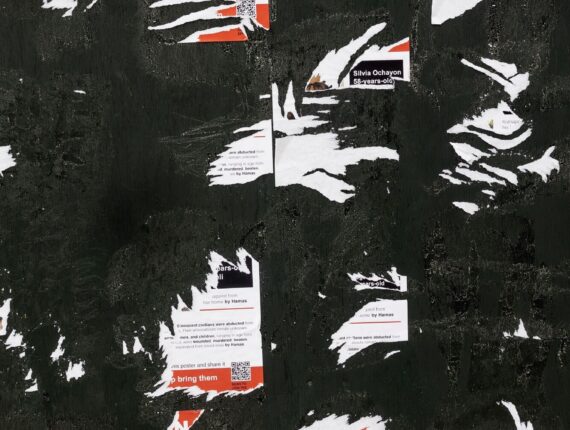
Defaced posters of people kidnapped by Hamas, distributed on New York University campus, in New York, on Oct. 25. Photographer: Andrew Lichtenstein/Corbis/Getty Image
Three college students of Palestinian descent out walking over the Thanksgiving break were shot in Vermont. A synagogue in Berlin was hit with Molotov cocktails. And a mosque in Ottawa was smeared with excrement.
Reports of crimes targeting Jews, Muslims and Arabs have risen in the US, Germany, Canada and beyond since the Oct. 7 Hamas attack on Israel, and the Israeli military’s retaliatory operation in Gaza.
While previous conflicts in the Middle East also sparked a backlash outside the region, this time it is more intense and the wave of hate may be far from cresting, according to advocacy groups, former law enforcement officials and analysts.
What’s new is “the virulent nature” of the attacks, said Michael Levitt, chief executive of the Canada-based Friends of Simon Wiesenthal Centre for Holocaust Studies. The Council on American-Islamic Relations, a Muslim civil rights organization, described an unparalleled “tsunami” of anti-Muslim hatred.
Homes and businesses have been vandalized in addition to places of worship. There have been assaults, threats and acts of intimidation at universities and on public transport. Tensions have crept into workplaces. A six-year-old Muslim boy of Palestinian descent was stabbed to death in Illinois.

Crosses in the front yard of the home where six-year-old Palestinian-American Wadea Al-Fayoume was stabbed to death by his landlord, in Plainfield, Illinois, on Oct.17. Photographer: Scott Olson/Getty Images
Part of the violence is linked to tensions rippling through diasporas. But the conflict has also been magnified through social media platforms like TikTok and Elon Musk’s X, and co-opted by hateful individuals on the far-right.
“It is a dangerous time if you are associated with a group involved in this conflict,” said Elizabeth Price, mother of Hisham Awartani, one of the young men attacked in Vermont. “In that toxic context, people take action on their own and with very devastating consequences.” She said her son, a 20-year-old student at Brown University, may never walk again.
The three friends were speaking a mix of Arabic and English at the time of the attack, and two of them were wearing black-and-white checkered keffiyeh scarves. Police said they are investigating the shooting as a possible hate crime, and that a 48-year-old White male has been arrested in connection with the incident.
A Conversation About Battling A Global Wave of Hate (Podcast)
Measuring the exact scale of the hate crime wave is impossible, as is making comparisons between countries. What constitutes such an act by law differs wildly from one place to another. And vulnerable groups don’t tend to report abuse, meaning it is hard to document each incident. But what is clear is that many Jews, Muslims and Arabs are describing unprecedented feelings of vulnerability and insecurity.
Liberal democracies now face a range of challenges, including balancing the need to protect free speech and the right to protest while preventing the spread of hate speech. They must also ensure tensions don’t drive permanent wedges between communities. All governments face the risk of more unrestrained and brutal violence.
Though fighting has ebbed over the past week after a hostage-release deal led to a temporary cease-fire, prospects for a long-term solution are dim.
“Many bridges got broken this time,” said Iman Atta, director of London-based Tell MAMA, which supports victims of anti-Muslim hate and Islamophobia. “People just don’t seem to see the humanity in each other.”
Here’s a look at how some of the divisions are playing out in seven key countries.
“Everyone who lives here must be measured against the same yardstick”
In Germany, 994 incidents of antisemitism were documented from Oct. 7-Nov. 9 by RIAS, an independent group funded by the federal government, a 320% increase from the same period a year prior. While authorities have not released official data about anti-Muslim hate crimes since the war began, they are also pervasive, according to community groups.
The debate over free speech is particularly fraught in Germany, where two historical realities have shaped its response to the attack by Hamas, which is designated a terrorist organization by the US and European Union, and the war in Gaza. The first is Germany’s role in the Holocaust, and its “special responsibility,” enshrined in law, to protect Jews from anything comparable happening again. The second is balancing the demands of a large migrant community with an increasingly restless and resentful electorate. More than 5.5 million Muslims live in Germany, and an estimated 30,000 Palestinians are in Berlin, making the city home to one of the largest diasporas outside the Middle East.
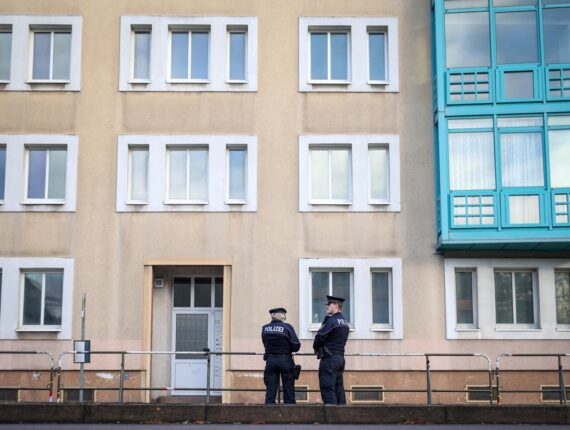
Police officers stand guard next to the new Weill Synagogue ahead of its opening in Dessau, Germany, on Oct. 22. Photographer: Ronny Hartmann/Getty Images
Sometimes the boundary between the acceptable and unacceptable is clear: It is illegal in Germany to deny or trivialize the Holocaust, burn the Israeli flag or publicly celebrate terror attacks. Most of the time, however, situations are more nuanced, and many Muslims in Germany today are asking whether the right to free speech is being limited under the auspices of fighting antisemitism — and if expressions of support for Palestinians are being conflated with support for Hamas.
The government has canceled dozens of planned pro-Palestinian protests, including one organized by the liberal Jewish group Judische Stimme. The Berlin Senate has given schools the option of banning the Palestinian flag on the basis it constitutes “a threat to school peace.” Non-citizens stand to lose their residency status if they engage in activity deemed antisemitic, and Interior Minister Nancy Faeser has proposed a law that would give federal agents the power to inform landlords, employers, friends and acquaintances of any person suspected of being a “radical Islamist.”
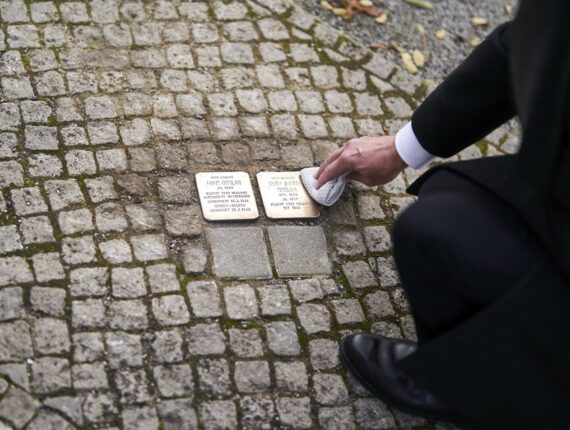
Scholz cleans the ‘stumbling blocks’ for Hans Goslar and Ruth Judith Goslar on the anniversary of the 1938 Nazi pogrom in Berlin, on Nov. 9. Photographer: Henning Schacht/Pool/Getty Images
Palestinians have also been disinvited from participating in art shows and cultural events, including the Frankfurt Book Fair.
“Everyone who lives here must be measured against the same yardstick,” Chancellor Olaf Scholz said as he marked the 85th anniversary of the 1938 Nazi pogrom against Germany’s Jews, “and that is our free and democratic basic order, which demands and guarantees diversity and respect for others.”
“I have never seen the South African community quite this unsettled”
In South Africa, the country’s Jewish Board of Deputies logged more than 80 antisemitic incidents over the past month, compared to an average of six a month prior to the war, including an attempt to run a rabbi’s car off the road. It noted that there had been explicit calls on public platforms for Jews to be attacked in their homes, workplaces and even in schools.
An unprecedented schism has opened between South Africa’s strongly pro-Palestinian government and the nation’s 1 million Muslims on the one side, and members of its 52,300-strong Jewish community on the other, as the country continues to grapple with how best to heal divisions caused by apartheid rule.
The government did condemn the Hamas attack but has since accused Prime Minister Benjamin Netanyahu and his administration of actions “tantamount to genocide” in Gaza, and on Nov. 22 parliament voted in favor of a plan to close Israel’s embassy in the country.
“The crime of genocide sadly looms large in Gaza,” International Relations Minister Naledi Pandor said on Nov. 8, slamming what she called Israel’s “collective punishment” of Palestinians and drawing parallels to the apartheid-era abuse of Black South Africans.
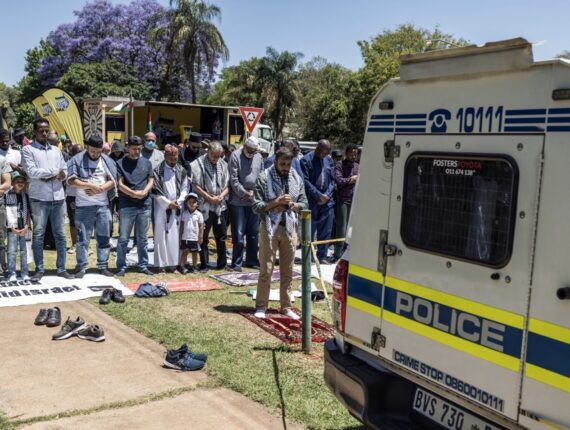
Muslims perform Friday prayers during a demonstration outside the Israeli Embassy in Pretoria, South Africa, on Oct. 20. Photographer: Marco Longari/AFP/Getty Images
The Jewish Board of Deputies in turn accused the government of bias toward Hamas and of endangering Jews. “I have never seen the South African community quite this unsettled,” said Karen Milner, the board’s national chairperson. “We expected some voice of condolence, some voice of empathy with regard to the horrific Hamas attacks. That never occurred.”
On Nov. 11, tens of thousands of people rallied in Cape Town, home to the country’s largest Muslim community, calling for a cease-fire. The following day Palestinian supporters violently disrupted a pro-Israel prayer meeting in the city. Four people were arrested and charged with public violence. Jewish schools and synagogues have visibly stepped up their security.
President Cyril Ramaphosa sought to defuse tensions, saying that prejudice, racism, violence or threats of violence have no place in modern South Africa. “Let our painful history be a reminder of the heavy cost of a divided nation that has turned against itself.”

Albanese visits the St Kilda Shule Hebrew Community in Melbourne on Oct 11. Photographer: James Ross/Pool/AFP/Getty Images
In Melbourne — which has the most Holocaust survivors per capita outside of Israel as well as a large Muslim community — police do not officially code hate crimes, but a review of incidents from Oct. 9 – Nov. 13 found 78 incidents relating to antisemitism and 16 to Islamophobia.
More than 60% of people want Australia stay out of the conflict entirely. But politicians continue to discuss it. The leader of the opposition center-right Liberal Party accused the government of not doing enough to curb antisemitic protests, prompting Prime Minister Anthony Albanese to accuse them of politicizing the topic.
The government is trying to walk a line straight down the middle — described by one columnist as “high risk, low reward.” Albanese’s party has a number of lawmakers with Jewish ancestry, including Attorney General Mark Dreyfus, as well as two Muslim ministers.
Against that backdrop, more than 600 of Australia’s business, political, sporting and community leaders, Jewish and non-Jewish, signed a statement this week rejecting hatred and discrimination. “We are unequivocal in our resolve that racism in all its forms is deplorable and abhorrent,” they said. “We will not tolerate such conduct in our workplaces and firmly reject it in our communities.”
“Our intention is not to convince, it’s to build a bridge”
In New York City, offences against Jews in October tripled from a year prior to 69, making up the bulk of the hate crimes investigated by the New York Police Department. Anti-Muslim and anti-ethnic attacks also increased, totaling 15, up from three a year before.
The New York area is home to the largest Jewish population outside of Israel, and biggest Muslim community in the US, and tensions are running especially high on its college campuses. A variety of protests have stoked unease between faculty and students of both faiths, who say they feel unsafe and unsupported.
Some pro-Palestinian students who signed motions or letters blaming Israel for provoking the Hamas attack found their names and details made public, leading to harassment and the rescinding of some job offers. Antisemitic incidents ranging from hate speech to outright assault have soared on campuses.
New York Governor Kathy Hochul ordered a probe of the City University of New York, where she says the rise in campus antisemitism is most acute. Three students sued New York University for allegedly allowing students and faculty members to “repeatedly abuse, malign, and threaten Jewish students with impunity.”
Amid pressure to act, the Department of Education recently said it is investigating eight universities for violating the Civil Rights Act, which requires US schools to protect students from certain types of discrimination. The majority of the complaints allege antisemitism.
There is a “high level of emotion right now in both communities,” said Imam Shamsi Ali, director of the Jamaica Muslim Center in Queens. Ali has been meeting Muslim and Jewish students to discuss campus safety concerns, along with longtime ally Rabbi Marc Schneier. They don’t pretend they have any solutions. “Our intention is not to convince, it’s to build a bridge,” Ali said.
More community leaders should be involved in condemning violence and intimidation, said Schneier, adding: “I do not understand why more people have not entered the space.”

Police and security outside the Center for Jewish Living after a student was accused of making antisemitic threats at Cornell University, in Ithaca, New York, on Nov. 3. Photographer: Matt Burkhartt/Getty Images
In London, where hate-crime data is publicly available, at least 434 people have been arrested for hate crime and public order offences since Oct. 7, the Metropolitan Police said. Antisemitism has spiked, with 533 crimes recorded in October 2023 — a 1,266% change compared to a year earlier. There were 212 Islamophobic offences, up 183%. Police are seeking more than 60 unnamed individuals.
The risk of hateful content spilling into real-life violence was brought into sharp focus in the UK on Nov. 11, when annual services marking the end of World War I coincided with a march in London against Israel’s Gaza operation. Far-right activist Stephen Yaxley-Lennon, commonly known as Tommy Robinson, used his recently restored X account to call on followers to join a counter-rally. Eighteen police officers trying to prevent that from happening were injured in ensuing scuffles, some with dislocations and broken bones.
Robinson’s activism, which he frames as pro-British, means he frequently targets Muslims, but a bid to join a demonstration against antisemitism on Nov. 26 was rejected by organizers and he was removed by police. Other White supremacy groups openly lean toward antisemitism, repeating tropes as they peddle conspiracy theories and disinformation about the war. Islamist extremists are also seeking to capitalise on tensions. Sometimes, there is crossover. A report last month by Reichman University, based in Herzliya, Israel, describes “a concerning nexus” between Hamas and online communities of far-right extremists that poses “a grave risk of inciting kinetic violence” against Jews. Testifying before Congress late last month, FBI Director Christopher Wray described the range of threats as “enormous.”
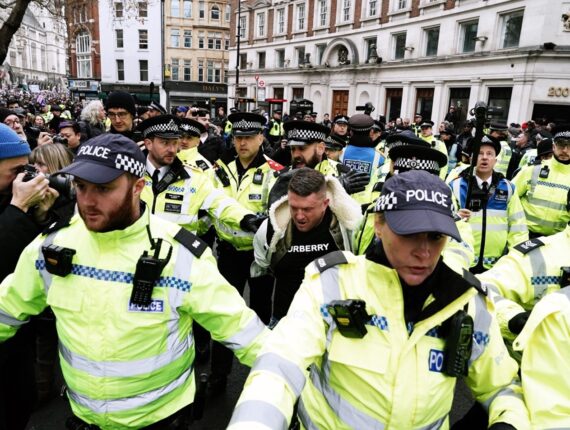
Robinson is led away by police officers during a march against antisemitism at the Royal Courts of Justice in London, on Nov. 26. Photographer: Jordan Pettitt/PA Images/Getty Images
Jens Binder, a cyberpsychologist at Nottingham Trent University, said the events in London on Nov. 11 were reminiscent of the storming of the US Capitol in January 2022. “Our main concerns with the dangers that we see at the moment is that some of these actions could take place in a very short span of time before security forces have a chance to adapt and to act,” he said.
In Buenos Aires in the five weeks through Nov. 15, antisemitic acts totaled 45, a figure equal to what the Argentine capital has registered for entire years in the past decade, according to data from DAIA, one of the country’s top Jewish organizations. The government’s anti-discrimination office doesn’t collect data on anti-Muslim hate crimes and its census doesn’t include data on the Muslim population.
The country is home to Latin America’s largest Jewish community, approximately 220,000 people, and stands to become Israel’s top ally in the region once President-elect Javier Milei, who said he intends to convert to Judaism, takes office on Dec. 10. Milei’s very first activity abroad after winning the election was visiting a rabbi’s tomb in New York City to pay thanks for his electoral victory.
Two terrorist attacks on Israeli and Jewish targets in Buenos Aires in the 1990s killed scores of people — 22 died in a bombing at the Israeli embassy in 1992 and two years later another 85 lost their lives in a blast at a Jewish community center, one of the deadliest antisemitic crimes since World War II. A report revealed last year by the Israeli secret service concluded that Hezbollah was responsible.
“If Canada can’t figure this out, tell me what corner of the world is going to figure this out?”
In Toronto, Canada’s biggest city and home to its largest Jewish and Muslim populations, there were 78 reports of hate crimes from Oct. 7-Nov. 20, compared to 37 in same six weeks in 2022, a rise of 111%. That figure includes 38 antisemitic acts compared to 13 in same period last year as well as 17 acts targeting Palestinian, Muslims or Arabs versus 1 last year. Canada routinely ranks among the most racially tolerant societies in the world. But the increase in hate crimes is surfacing simmering tensions.
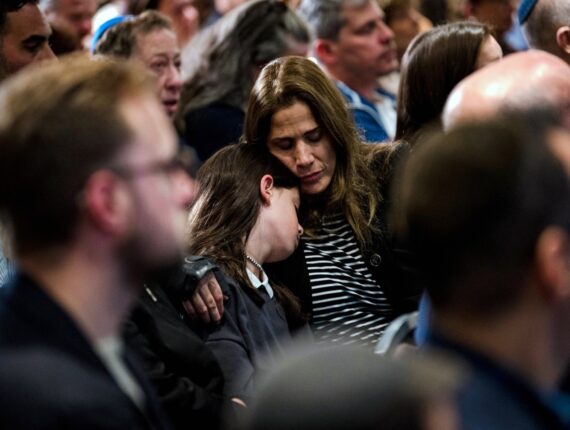
Members of the Jewish community gather for a vigil at the Gelber Conference Centre in Montreal on Oct. 9. Photographer: Andrej Ivanov/AFP/Getty Images
A man attacked worshippers outside a mosque with a bike chain this month and a woman wearing a hijab was assaulted as she walked down the street. A Jewish school was evacuated because of a bomb threat. And an Indigo Books store, a major chain owned by prominent Jewish entrepreneur Heather Reisman, was covered with red paint and slurs. The city has added officers to its hate crime unit, set up command-posts in high-risk areas and created an online portal to report hate-related graffiti.
“This is not who we are as Canadians,” Prime Minister Justin Trudeau said in a Nov. 8 news conference, in which he pleaded for Canadians to recognize “each other’s pain and fear.”
He added: “If Canada can’t figure this out, tell me what corner of the world is going to figure this out?”
— With assistance from Jessica Loudis, Michael Cohen, Ben Westcott, Eamon Farhat, Katia Porzecanski, Danielle Bochove, Daniel Zuidijk, Jenny Che, Stephen Carroll, Christopher Pitt, Paul Vecchiatto, Patrick Gillespie, Jody Megson, and Silvia Martinez
—





